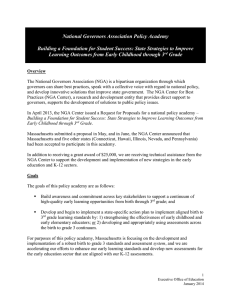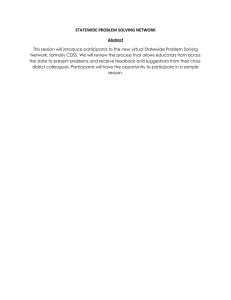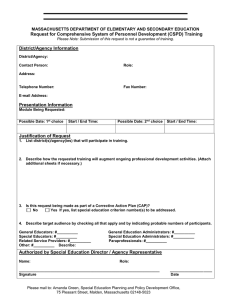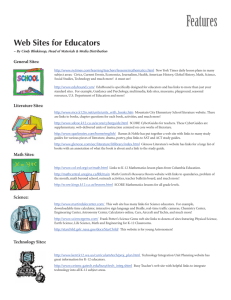’ P P O
advertisement
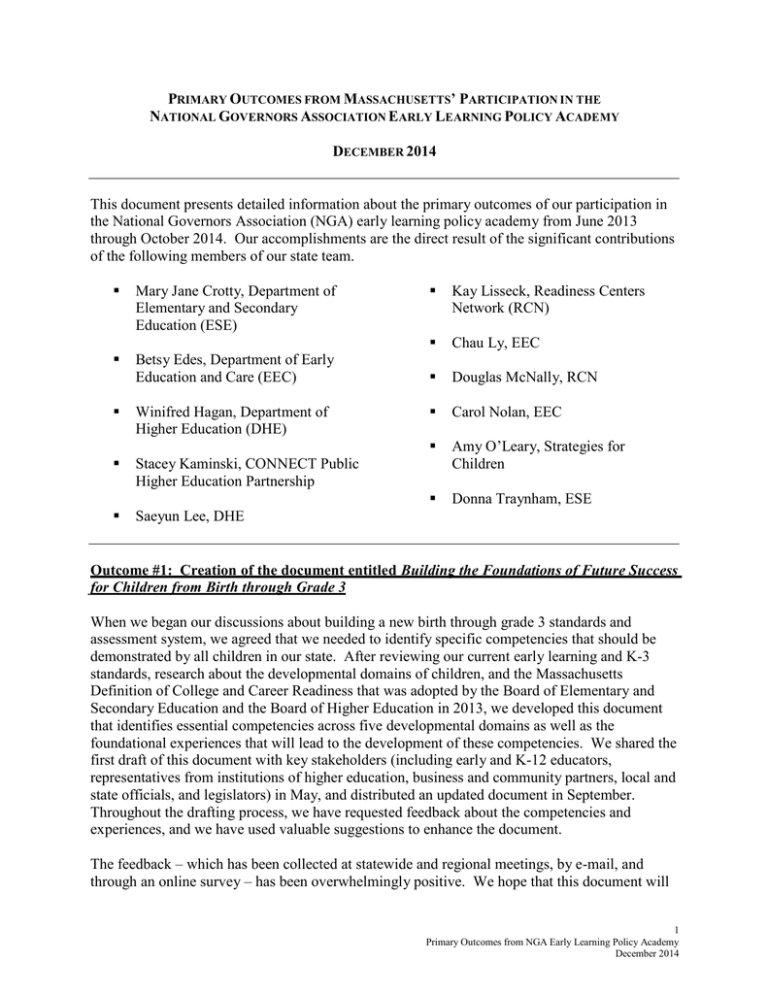
PRIMARY OUTCOMES FROM MASSACHUSETTS’ PARTICIPATION IN THE NATIONAL GOVERNORS ASSOCIATION EARLY LEARNING POLICY ACADEMY DECEMBER 2014 This document presents detailed information about the primary outcomes of our participation in the National Governors Association (NGA) early learning policy academy from June 2013 through October 2014. Our accomplishments are the direct result of the significant contributions of the following members of our state team. Mary Jane Crotty, Department of Elementary and Secondary Education (ESE) Betsy Edes, Department of Early Education and Care (EEC) Winifred Hagan, Department of Higher Education (DHE) Stacey Kaminski, CONNECT Public Higher Education Partnership Saeyun Lee, DHE Kay Lisseck, Readiness Centers Network (RCN) Chau Ly, EEC Douglas McNally, RCN Carol Nolan, EEC Amy O’Leary, Strategies for Children Donna Traynham, ESE Outcome #1: Creation of the document entitled Building the Foundations of Future Success for Children from Birth through Grade 3 When we began our discussions about building a new birth through grade 3 standards and assessment system, we agreed that we needed to identify specific competencies that should be demonstrated by all children in our state. After reviewing our current early learning and K-3 standards, research about the developmental domains of children, and the Massachusetts Definition of College and Career Readiness that was adopted by the Board of Elementary and Secondary Education and the Board of Higher Education in 2013, we developed this document that identifies essential competencies across five developmental domains as well as the foundational experiences that will lead to the development of these competencies. We shared the first draft of this document with key stakeholders (including early and K-12 educators, representatives from institutions of higher education, business and community partners, local and state officials, and legislators) in May, and distributed an updated document in September. Throughout the drafting process, we have requested feedback about the competencies and experiences, and we have used valuable suggestions to enhance the document. The feedback – which has been collected at statewide and regional meetings, by e-mail, and through an online survey – has been overwhelmingly positive. We hope that this document will 1 Primary Outcomes from NGA Early Learning Policy Academy December 2014 serve as the anchor for the development and implementation of all birth through grade 3 initiatives in Massachusetts. In particular, we hope that it will guide the development and implementation of new standards and assessment strategies; new policies with regard to pre- and in-service support for educators; and new initiatives to enhance the interactions among children, their peers, parents and family members, educators, and other essential adults. Outcome #2: Establishment of New Preschool and Kindergarten Social and Emotional Learning Standards Based on an internal assessment of our early learning standards as well as an independent evaluation of the content of these standards, our group agreed that we needed to focus on enhancing our preschool and kindergarten standards. In particular, these standards did not sufficiently address social and emotional learning, and they were not adequately aligned with our existing infant and toddler standards. As such, after further reviewing our early learning standards, our K-12 health standards, and national preschool and Head Start standards, we are developing new standards that include Interpersonal Development, Personal Development, Engagement with Adults, and Engagement with Peers. We are using these standards to revise and further develop our infant and toddler and also kindergarten standards, and guide the potential development of K-12 social and emotional learning standards in the longer-term. EEC has established an exciting relationship with the University of Massachusetts Boston, which will expand upon the development of our new standards as well as indicators for social and emotional learning. Outcome #3: Successful statewide conference – Birth Through Grade 3 Policy Forum: Developing Strategic Pathways to College and Career Success On May 16, 2014, we convened a successful statewide conference that was designed to provide attendees with the opportunity to discuss strategies for enhancing early learning standards, developing new assessment strategies, increasing educator effectiveness, and increasing alignment between the early education and K-12 sectors. The full-day event included remarks from Commissioners Weber, Chester, and Freeland; remarks from Albert Wat at the NGA; a keynote address by Ralph Smith, Managing Director of the Campaign for Grade Level Reading and Senior Vice President of the Annie E. Casey Foundation; a panel presentation that included Alex Morse, the Mayor of Holyoke and Sergio Páez, Superintendent of the Holyoke Public Schools; and seven small group discussions focused on specific topics that yielded specific policy and other recommendations for our state. Approximately 250 attendees (including early educators, K-12 educators, representatives from institutions of higher education, municipal officials, and business and community partners) participated in the discussions over the course of the day, and the feedback about the event was also overwhelmingly positive. In addition to receiving feedback about the Building the Foundations document, enhancing our early learning standards, and developing new assessment strategies, the attendees greatly appreciated the fact that our Commissioners jointly emphasized the importance of building a foundation for future success and ultimately college and career readiness and also pledged their commitment to increase policy alignment across the early education, K-12, and higher education sectors. We have discussed the possibility of convening another conference in 2015, and have also discussed the importance of organizing regional meetings, hosted by our Readiness Centers, to continue the conversations about our work. 2 Primary Outcomes from NGA Early Learning Policy Academy December 2014 Outcome #4: Creation of our new website – Building the Foundations for College and Career Success for Children from Birth through Grade 3 In July 2014, with support from the Executive Office of Education, we launched our new birth through grade 3 website (www.mass.gov/edu/birththroughgrade3). The website has been designed to achieve two goals: first, it will serve as a resource for key stakeholders regarding the development and implementation of exciting strategies in Massachusetts; and second, it will serve as an important tool for sharing information about our work and highlighting upcoming activities and events. The website currently presents information about our participation in the NGA policy academy, the Building the Foundations document, and our statewide policy forum. We will update the content on the website on an ongoing basis. Outcome #5: Creation of the Framework for a Comprehensive Birth through Grade 3 Policy Agenda We decided to expand upon our policy academy work and develop the framework for a comprehensive policy agenda for Massachusetts. This agenda currently includes five components (enhancing our early learning standards, creating a robust assessment system, enhancing educator effectiveness, increasing family and community engagement, and providing comprehensive support services to children and families). Our framework currently includes – for the overall agenda and each of the five components – detailed information about our key principles and goals, current initiatives, policy gaps and issues for further consideration, action items, and short- and longer-term strategies. For additional information about our participation in the NGA early learning policy academy and these primary outcomes, please contact Saeyun Lee (saeyun.lee@bhe.mass.edu or 617.994.6905) at the Department of Higher Education. 3 Primary Outcomes from NGA Early Learning Policy Academy December 2014
